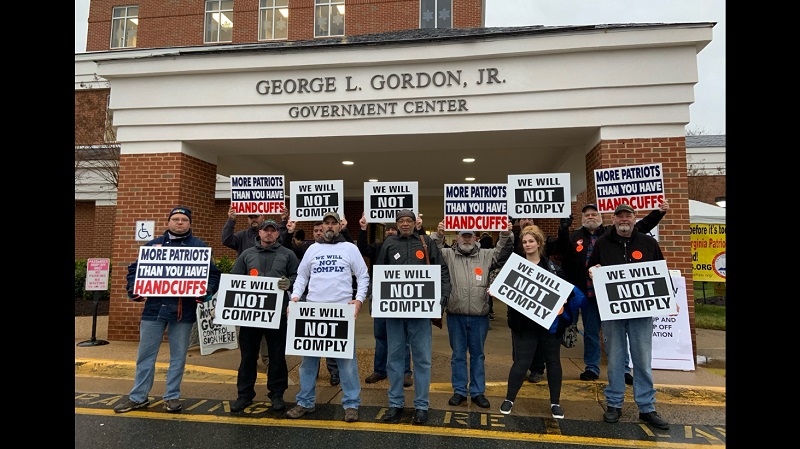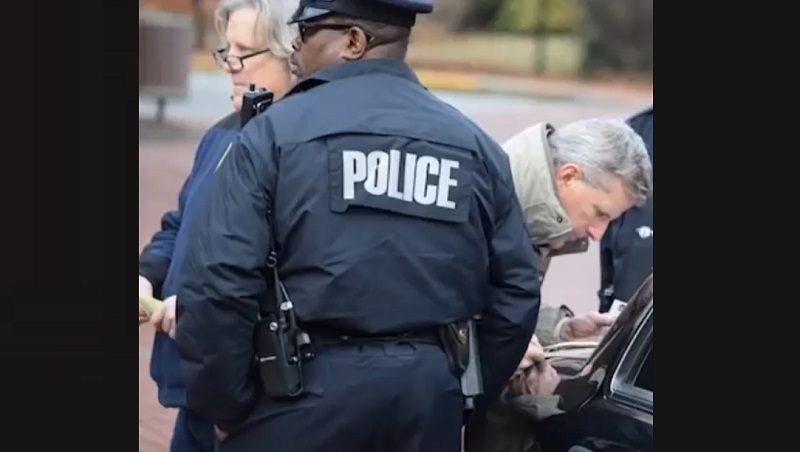

In a friend-of-the-court brief filed in March 2022 with the United States Court of Appeals for the Fourth Circuit, the National Police Association (NPA) argued that the Fourth Circuit should overturn the denial of summary judgment to an officer who had arrested protestors on the grounds of the Maryland State Capitol building after those protestors violated Maryland state law in the course of conducting their protest. In June 2023, the Fourth Circuit sided with the officer and reversed the lower court, granting judgment for the officer and dismissing the lawsuit against him.
Sgt. Brian T. Pope with the Maryland Capitol Police was called to direct a group to move their protest off a sidewalk near the Maryland State Capitol building and onto an adjoining grassy area called Lawyers’ Mall. When Sgt. Pope later returned the group had grown, but had not relocated. Sgt. Pope again ordered the protestors onto the Mall. When the protestors refused, Sgt. Pope advised them they were subject to arrest. When they still did not move, Sgt. Pope began to arrest the group’s leader as others filmed.
The protesters operate under the name Patriot Picket, maintaining a YouTube channel, Facebook page, and website. They wear shirts that say “We Will Not Comply” and hold signs that say “More Patriots Than You Have Handcuffs”. They describe their methodology as media-savvy activism. In this case, they made a video of their protest and of the sergeant advising them to stop blocking the sidewalk. The leader of the protest is on video stating he would be arrested on purpose.
Breaking a law to create content for a YouTube channel is generally considered civil disobedience. Practitioners of civil disobedience usually portray their arrest as an exhibition of moral superiority and a demonstration that they believe so strongly in their cause they are willing to break the law and suffer the consequences. In this case, however, the protest leadership not only didn’t take ownership of the arrest they manufactured but sued the arresting officer for doing his job. A job made necessary by the protesters’ creation of YouTube content.

When the lower court failed to adhere to the law and denied the sergeant’s qualified immunity against frivolous lawsuits the National Police Association entered the case. It was imperative this bad decision not become the law of the land in the Fourth Circuit due to affirmation by the appellate court.
The protestors’ suit alleged violations of the First Amendment and Fourth Amendment rights. The NPA’s amicus brief urged the Fourth Circuit to examine a more fundamental question: whether the protestors were acting lawfully at all, as unlawful acts tend not to incur First Amendment protection.
In June 2023, the Fourth Circuit issued its opinion which reversed the District Court’s order and granted qualified immunity to the officer. The Fourth Circuit closed its opinion with a lengthy explanation of the context of the dispute—a dispute which had at its center the questions of lawfulness and danger posed by protesters who engage in bad-faith acts for the purpose of filming the police’s response, which the NPA’s brief addressed. The NPA welcomes the Fourth Circuit’s ruling as a needed acknowledgment of the dangers that law enforcement face when interacting with protestors and social media content creators, especially near government buildings.
This is the fourth case where protesters have claimed a right to break the law under the umbrella of the First Amendment that the NPA has entered on the side of police officers.
The National Police Association is represented by Robert S. Lafferrandre of Pierce Couch Hendrickson Baysinger & Green, L.L.P., of Oklahoma City, Oklahoma. The case is Hulbert v. Pope, No. 21-1608, before the United States Court of Appeals for the Fourth Circuit. The decision can be viewed here: 6O78524-Hulbert-v.-Pope-Published-Opinion
About The National Police Association: The National Police Association (NPA) is a 501(c)3 Educational/Advocacy non-profit organization. For additional information visit www.nationalpolice.org
###